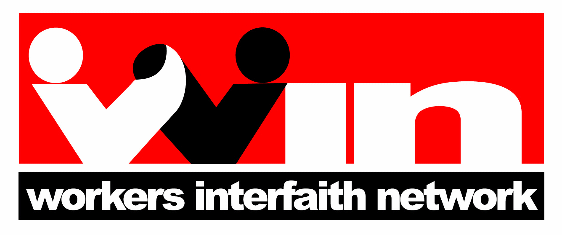I've heard from a couple of Workers Interfaith Network members who are wondering why WIN is holding a prayer vigil next week to stand up for immigration reform, and against Arizona's SB 1070. Before I tell you why, I invite you to
sign up for the Isaiah 58 vigil, which will be held next Tuesday, July 6th at 6:30 p.m. at Gaisman Park. Whether you are someone who is at risk of being racially profiled under bills like SB 1070, or you are someone like me who is relatively safe from the effects of it, it's important that we speak with one voice for justice.
So, why is WIN holding this vigil?
First, our faiths call us to speak, pray, and act for justice for immigrants in the same way that we speak, pray, and act for justice with people who were born in this country. As a Christian, my faith story is one in which leaders including Abraham, Moses, and Jesus lived the life of an immigrant. Matthew 25:31-46 makes the bold claim that whatever we do to the least among us, including refusing hospitality to immigrants, we have not done to Christ. In the Hebrew scriptures, God reminds us again and again that we are to love the immigrant as ourselves, because were were once strangers in the land of Egypt. (Exodus 23: 9, Leviticus 19:33-34). In God's eyes, there is no room for dividing ourselves into camps of native-born and camps of immigrants. We are all strangers on this earth, dependent on God's grace and care.
Second, Arizona's SB 1070 is a distraction from the needed solution to our immigration problems, which are very real. What is really needed is
comprehensive immigration reform. If you are not an immigrant yourself, you may not realize that if
you are an "unskilled" worker, it is next to impossible to immigrate legally to the United States unless you have close relatives who are citizens or green card holders. To say our immigration system is broken is a gross understatement. Enforcement actions like expanding local police powers on immigration, or focusing only on border security, will not work. As long as there is severe unemployment and poverty wages in other countries, people will continue to immigrate to the United States looking for work. It is in all of our best interests if more workers have a way to immigrate legally, instead of living in the shadows because they are undocumented.
Third, SB 1070 will almost certainly lead to some racial profiling of Latinos and other people of color. The law
requires police to interrogate people about their immigration status during any lawful stop (such as a traffic stop), and allows the police to arrest someone without a warrant if they believe they are removable from the United States. So, if you have an accent, are Latino, or have dark skin, and you cannot persuade an officer that you are a legal resident of the United States, you could be headed to jail. For more information about the specifics of SB 1070 and why they matter, the
Immigration Policy Center has done an excellent analysis of the law.
Fourth, SB 1070 will not make Arizonans safer. Law enforcement will have to spend more of their time investigating whether ordinary people who are just trying to work and make a life are undocumented, rather than investigating serious criminals. Crime being committed by drug cartels in states like Arizona won't be stopped by arresting and deporting hardworking construction workers, farmworkers, and janitors.
Finally, there are signs that legislation very similar to SB 1070 will likely show up in the Tennessee legislature in the 2011 session. Before they adjourned, the
legislature passed a resolution praising Arizona for its actions. Legislators in 22 states have either introduced, or are considering introducing, copycat bills of SB 1070.
If Tennessee passes a similar bill, immigrants, both those who are documented and undocumented, will live in fear. Volunteers for churches and social service agencies that provide ministries of mercy to undocumented immigrants could face charges for simple things like providing someone a ride to church. State and local law enforcement will face an unfunded mandate to try to determine everyone's immigration status, while taking their attention away from serious and dangerous crimes. Tennessee will develop a reputation as an unwelcoming place that does not want diversity in our state.
Please stand with us next week on July 6th as we pray for justice. It will be an interfaith vigil, and we encourage people of all faith backgrounds to attend. If you can't be there, hold a personal vigil at your home or congregation next week. With either action,
please be sure to sign up with WIN so that your name is added to a petition to Governor Bredesen, urging him to reject legislation like SB 1070 here in Tennessee.







